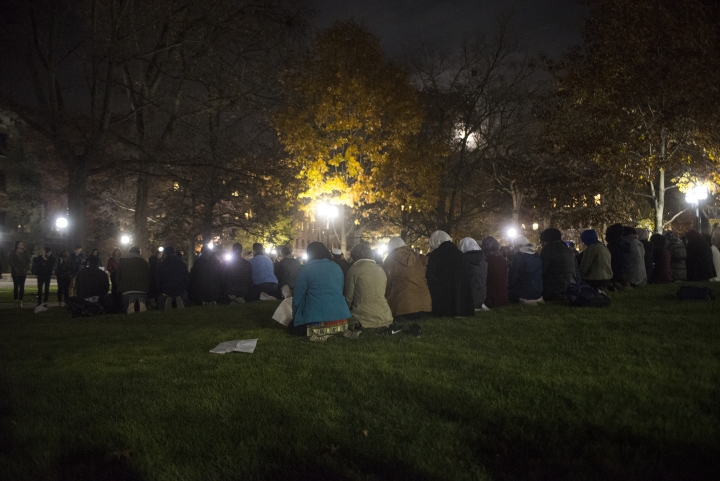(AhlulBayt News Agency) - About 300 students and faculty members gathered on Monday night at a large open space in the middle of the Michigan University Central Campus for a congregational Isha prayers, held by the Muslim Students’ Association (MSA) following threats against Muslim women on campus this week.
On Friday night, a female student wearing a hijab was approached by a man who threatened to light her on fire if she did not remove her head covering. Another female student was approached by two men who referenced her religion, yelled at her for being in the United States and pushed her down a hill on Saturday night. Both crimes have been classified as intimidation crimes, with the latter classified as ethnic intimidation.
Also on Friday, a student found a swastika and hateful message written on the door of his apartment, The Michigan Daily News reported.
MSA President Farhan Ali, an LSA junior, said he was surprised by a large number of people who attended. He noted that to show solidarity with the female Muslim students on campus, male Muslims have been wearing the kufi, a traditional hat for Muslim men.
“People have these myths about Islam, and that’s how Islamophobia occurs,” Ali said. “We’re trying to figure out ways we can see to make this campus safer.”
From his side, University President Mark Schlissel and other administrators sent out an email on Sunday night condemning incidents of intimidation and calling for unity on campus across political ideologies. “We hope all members of our community can agree that we must not stand silent while facing expressions of bigotry, discrimination or hate that have become part of our national political discourse,” Schlissel wrote in the email.
The incidents follow the election of Donald Trump to the presidency on Tuesday, who proposed a ban on all Muslim immigration during the campaign.
Organizers said Monday night’s gathering which was open to Muslims and non-Muslim allies of the organization aimed to give voice to those in fear following the election, as well as to initiate unity among all students on campus.
Public Policy junior Stephen Wallace said he attended the event with other Black students to show solidarity with Muslims. Wallace said he would like to see further action from the University administration on alt-right posters, which have been posted around campus intermittently since earlier this fall, targeting Muslim, Black, and female students.
Posters promoting white supremacy and calling for students to report undocumented immigrants were found on campus early Monday morning, alongside phrases such as “Make America Great Again.” “We’re here for (Muslims) as a fellow minority, another marginalized group of people,” Wallace said. “I hope that President Schlissel does address the hateful flyers that have been posted up. I think that more needs to be done to investigate who is posting these flyers because people have been posting these going back to September … and it seems like nothing is being done to stop them.”
Over the past week, many in the University community have responded to the election by hosting and attending vigils and protests. A unity march with hundreds of Ann Arbor families also occurred Sunday afternoon, aimed to promote peace and support for all communities.
Sophomore Rami Ebrahim, social justice and activism chair for MSA who helped organize the prayer gathering, said he hopes to see further action from the administration aside from crime reports and emails, such as specific safety initiatives. “There’s a tense climate on campus, especially for Muslim students, and especially for more identifiable Muslim students especially the women,” Ebrahim said. “We wanted to show that some of the things happening on campus are not representative of the student body or are representative of all of the country in general.”
/257
source : michigan daily
Tuesday
15 November 2016
1:35:49 PM
792094
Students at University of Michigan hold congregational prayer on campus following hate crimes

About 300 students and faculty members gathered on Monday night at a large open space in the middle of the Michigan University Central Campus for a congregational Isha prayers, held by the Muslim Students’ Association (MSA) following threats against Muslim women on campus this week.
